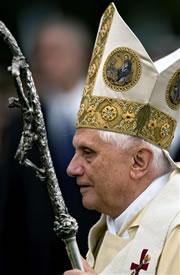 Will Pope Benedict XVI comment on Cardinal Trujillo's statements about the excommunication of embryonic stem cell researchers?© AP Photo/Vadim Ghirda
Will Pope Benedict XVI comment on Cardinal Trujillo's statements about the excommunication of embryonic stem cell researchers?© AP Photo/Vadim GhirdaAs the Catholic church holds its World Meeting of Families in Valencia, Spain, this week, some will be watching to see if Pope Benedict XVI supports the excommunication of those working with embryonic stem cells.
Cardinal Alfonso López Trujillo's recent comments on stem-cell work have jolted the scientific world, along with some Catholics. "Destroying an embryo is equivalent to abortion," Trujillo, a Colombian who heads the Vatican's Pontifical Council for the Family, told Italy's leading Catholic magazine Famiglia Cristiana in an interview published 2 July. "Excommunication is valid for the women, the doctors and researchers who destroy embryos."
The church currently threatens excommunication for women and medical personnel who participate in abortions. But Trujillo's is the first public statement from a top Vatican official calling for the excommunication of Catholic scientists who destroy embryos, says Jean Porter, professor of theology at the University of Notre Dame in Indiana. It is unclear whether Trujillo also meant to include scientists who work with embryo-derived stem cells.
The pope would have to endorse any move to change the church's Code of Canon Law, says Porter. Pope Benedict probably supports the substance of Trujillo's comments, she says, but adds: "My suspicion is that he would not be quick to codify this into Canon Law."
The Vatican press office declined to comment to news@nature.com, and Trujillo's office said that he was away and unable to comment until his return.
Hope for change
Oliver Brüstle, a Catholic and a prominent embryonic stem-cell researcher, cautions that the statement is unofficial. "I don't think it should be further inflated before there is an official statement from the Vatican," he says.
Brüstle, who works at the University of Bonn, Germany, says he hopes the Church will not go so far in any statement against stem cell researchers. Rapid progress in molecular biology and stem-cell reprogramming are challenging the traditional definitions of the beginning of human life, he notes. "For the Catholic Church this is a unique opportunity to demonstrate that it can still provide moral leadership in complex issues of modern society," Brüstle says. "To live up to this challenge takes more than mediaeval castigatory statements."
Carlos Bedate, molecular biologist at the Autonomous University of Madrid, Spain - and a Jesuit priest - thinks that Trujillo meant his comments to include all researchers working with embryonic stem cells.
ADVERTISEMENT
But Bedate hopes that the Church may soon change its views on the beginnings of life. "Trujillo is only one person and the church leadership is the hands of the Pope and many other hands. I don't think his statement is the final statement," he says.
Porter, however, thinks any softening in the church's opposition "highly unlikely".
For many, any Church decision, even by the Pope, will not make much difference. Cesare Galli of the Laboratory of Reproductive Technologies in Cremona, Italy, was educated as a Catholic and was the first scientist to clone a horse. "I don't think scientists involved with embryonic stem-cell research would care if they are excommunicated or not," he says.
Visit our newsblog to read and post comments about this story.
